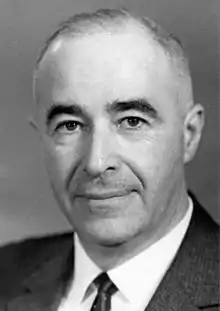Ilya Lifshitz
Ilya Mikhailovich Lifshitz (Russian: Илья́ Миха́йлович Ли́фшиц; January 13, 1917 – October 23, 1982) was a leading Soviet theoretical physicist, brother of Evgeny Lifshitz. He is known for his works in solid state physics, electron theory of metals, disordered systems, and the theory of polymers.[1][2]
Ilya Mikhailovich Lifshitz | |
|---|---|
 | |
| Born | January 13, 1917 |
| Died | October 23, 1982 (aged 65) |
| Alma mater | University of Kharkiv, Kharkiv Polytechnic Institute |
| Known for | Lifshitz tails Lifshitz exponent Lifshitz–Kosevich formula Self-averaging spectral shift function supersolidity |
| Awards | Lenin prize |
| Scientific career | |
| Fields | Physics |
| Institutions | Kharkov Institute of Physics and Technology Institute for Physical Problems |
| Doctoral advisor | Lev Landau |
| Doctoral students | Arnold Kosevich |
Work
Together with Arnold Kosevich, Lifshitz established (1954) connection between the oscillation of magnetic characteristics of metals and the form of an electronic surface of Fermi (Lifshitz–Kosevich formula) from de Haas–van Alphen experiments.
Lifshitz was one of the founders of the theory of disordered systems.[3] He introduced some of the basic notions, such as self-averaging, and discovered what is now called Lifshitz tails and Lifshitz singularity.
In perturbation theory, Lifshitz introduced[4] the notion of spectral shift function, which was later developed by Mark Krein.
References
- Odijk, T. (1997). "Ilya M. Lifshitz. An appreciation". Physics Reports. 288 (1–6): 9–12. Bibcode:1997PhR...288....9O. doi:10.1016/S0370-1573(97)00019-7.
- Grosberg, A. Yu.; Khokhlov, A. R. (1994). Statistical Physics of Macromolecules. Springer. ISBN 978-1-56396-071-0.
- Gredeskul, S.A.; Pastur, L.A. (1985). "Works of I. M. Lifshitz on disordered systems". J. Stat. Phys. 38 (1/2): 25–36. Bibcode:1985JSP....38...25G. doi:10.1007/BF01017846. S2CID 121577109.
- Lifshitz, I.M. (1952). "On a problem of the theory of perturbations connected with quantum statistics". Uspekhi Mat. Nauk. 7 (1 (47)): 171–180.
